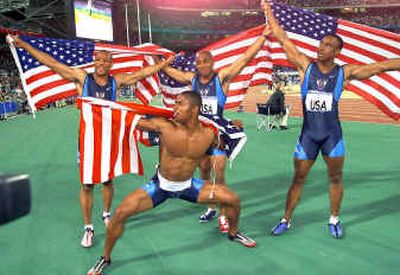Win or lose, just do it right

Nobody had much cause to think about it. There was always a dignity that seemed to go along with winning an Olympic medal. Even in Mexico City in 1968, when John Carlos and Tommie Smith stood on the Olympic podium during their awards ceremonies, heads bowed, each with a single black-gloved fist raised skyward in a symbolic civil rights protest, it was accomplished with class.
Through the years, with few exceptions, athletes of all nations for the most part never slid into the boorish posture of sore winners. They train too hard, too long and often too much alone to cheapen what the right to compete on this level should mean.
Even in the great clash of ideologies that marked the Cold War, there was a unity among the athletes. The political commissars of the East and the stuffed-shirt blue-blooded satraps of the West may have given the competition some pseudo-political meaning, but as for the athletes, all you had to do was watch the joyous social interaction in the Olympic Village discos, restaurants, recreation halls and outdoor gathering places.
All you had to do was trace the love story of Olga Fikotova, the Czech discus thrower, and the American Hal Connolly, one of the greatest hammer throwers in Olympic history, when they met in the Olympic Village at Melbourne in 1956.
Remember the way Olympians from all over the globe singled out Nadia Comaneci, the tiny Romanian gymnast who scored the first Olympic “perfect 10” in Montreal in 1976? Or the way athletes who knew no English responded to Cassius Clay, later to become Muhammad Ali, stopping all who would listen in Rome in 1960 and flashing them with the gold medal around his neck?
For all the drugs, cheating and checkered history of money-under-the-tables, cars and apartments in Iron Curtain countries that often made amateurism a fraud and a sham, the fact remains that relations among athletes have generally been so strong that American college, high school and middle school kids could learn a great lesson from them.
You may recall that a German once loaned a vaulting pole to his closest American rival or that a German long jumper at the 1936 Berlin Olympics, against a background of Nazism and hate, privately sought out Jesse Owens and gave him a critical suggestion about technique.
Over the years, the athletes have done quite well behaving as human beings toward each other.
So why is it that the United States Olympic Committee brought in former Olympic swimmer Janet Evans and long jumper Bob Beamon to lecture on the etiquette of winning to a group of this year’s Olympians at a Colorado training facility?
Two reasons come quickly to mind, two incidents that typify everything the Olympics are not supposed to be, two groups of offenders. Of course, they were from the United States and they gave a new dimension to the catchwords “ugly American.”
Flash back to Barcelona 1992 and the Dream Team, that magnificent basketball squad of traveling Hessians, the best Olympic basketball team ever assembled, and the richest of the NBA rich.
They were marvelous. They were also the only U.S. team that did not live in the Olympic village. They trained in Monte Carlo. At a time when terrorism was a modest threat, they were more obviously protected and isolated than the gold of Fort Knox.
And in the end, they gave Spain some ugly memories.
Some members refused to wear the official awards ceremony uniform because it was designed by a rival of the other companies that had them under contract. What they did was wrap themselves in American flags for the medal ceremony. But much of the non-American audience saw the flags and the laughter and palm-slapping at an Olympic medal ceremony as taunting. It did not go down well.
In 2000, the Americans’ victorious 4x100 track relay team outdid the Dream Team when it won. Team members put on a boorish display using the flag as a prop. They pranced back and forth. Despite their skills, they won no friends.
This weekend Evans and Beamon showed the video of that relay team’s celebration. Beamon, who personally accounted for one of the Games’ greatest single moments in history with his magnificent long jump at Mexico City, was quoted by USA Today as saying that this “was not an attempt to embarrass anyone. But you have to be very conscious that we have to treat the flag (and our opponents) with pride and dignity.”
It’s called sportsmanship.
Before the big money, the soccer moms and the basketball dads, before organized Little League drafts and shoe contracts for 15-year-olds, before trash talk and end-zone dances, before all of that it used to be automatic in our games and our lives.